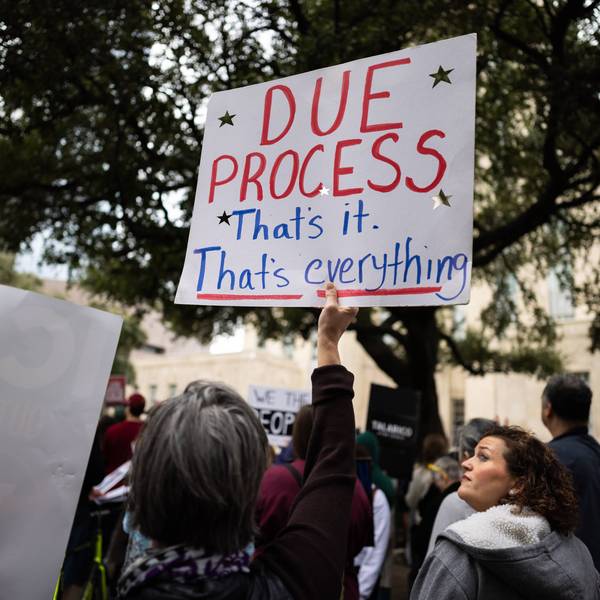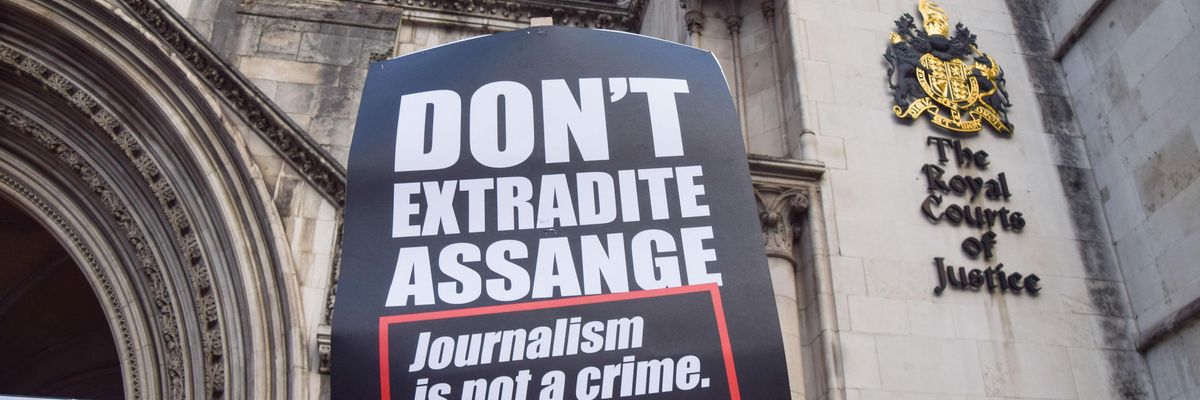A U.K. court is set to rule Friday on whether WikiLeaks publisher and journalist Julian Assange can be extradited to the United States, an impending decision that led press freedom advocates and human rights campaigners to redouble their calls for his immediate release.
"We fully believe that Assange has been targeted for his contributions to journalism."
"Freedom should be the only possible outcome for Assange," Kristinn Hrafnsson, the editor-in-chief of WikiLeaks, said Thursday.
In 2019, the Trump administration hit Assange with multiple counts of violating the Espionage Act, charges that were immediately seen as a grave threat to press freedom given that they stemmed from Assange's publication of classified documents that exposed U.S. war crimes.
Ignoring pleas from high-profile human rights organizations such as the ACLU, Amnesty International, and the Committee to Protect Journalists, the Biden administration has thus far refused to drop its predecessor's efforts to extradite Assange, who is currently languishing in a high-security prison in southeast London.
"We fully believe that Assange has been targeted for his contributions to journalism, as WikiLeaks' publication of thousands of leaked classified documents--the basis of the U.S. charges--informed extensive public interest reporting by media around the world, exposing war crimes and human rights violations," Rebecca Vincent, director of international campaigns for Reporters Without Borders wrote in a recent op-ed for Deutsche Welle.
"We continue to call for the charges against Assange to be dropped, and for him to be immediately released and certainly not extradited to the U.S.," Vincent added. "Assange's extradition and prosecution would have severe and long-lasting implications for journalism and press freedom around the world; the impact simply cannot be understated."
In early January, roughly two weeks before President Joe Biden took office, a U.K. judge ruled against the U.S. extradition request, arguing the nation's carceral system is so brutal that it would endanger the WikiLeaks founder's life.
The Biden administration appealed the ruling a month later and promised the U.S. would not imprison Assange under harsh conditions if the court permits his extradition to face criminal charges.
But Amnesty International, among others, argues that U.S. assurances are hollow and not to be trusted.
"The U.S. made it very easy for us to oppose the extradition, because they gave with one hand and took away with the other," the group said earlier this year. "They say: we guarantee that he won't be held in a maximum-security facility and he will not be subjected to Special Administrative Measures and he will get healthcare."
"But if he does something that we don't like... we reserve the right to put him in a maximum-security facility, we reserve the right to offer him Special Administrative Measures. Those are not assurances at all," Amnesty added. "It is not that difficult to look at those assurances and say: these are inherently unreliable, it promises to do something and then reserves the right to break the promise."
Speaking to the Evening Standard last month, Stella Moris--Assange's fiancee--stressed that the U.S. attempt to prosecute Assange is extremely dangerous "because it sets a precedent in relation to press freedoms."
"It's completely an insane proposition that has huge implications for press freedom and will just encourage others," said Moris, who added that "if Julian dies in a U.K. prison, I think it's catastrophic for the U.K.'s credibility because the U.K. would be primarily responsible."
"They hold the key to his cell," she continued. "They can stop this anytime. The problem is the perception that this is a judicial matter, when this is actually a political case."




